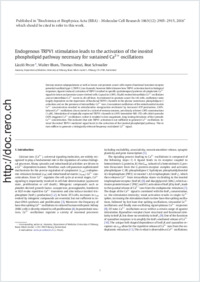Endogenous TRPV1 stimulation leads to the activation of the inositol phospholipid pathway necessary for sustained Ca2+ oscillations
- Pecze, László Anatomy, Department of Medicine, University of Fribourg, Switzerland
- Blum, Walter Anatomy, Department of Medicine, University of Fribourg, Switzerland
- Henzi, Thomas Anatomy, Department of Medicine, University of Fribourg, Switzerland
- Schwaller, Beat Anatomy, Department of Medicine, University of Fribourg, Switzerland
-
20.09.2016
Published in:
- Biochimica et Biophysica Acta (BBA) - Molecular Cell Research. - 2016, vol. 1863, no. 12, p. 2905–2915
English
Sensory neuron subpopulations as well as breast and prostate cancer cells express functional transient receptor potential vanilloid type 1 (TRPV1) ion channels; however little is known how TRPV1 activation leads to biological responses. Agonist-induced activation of TRPV1 resulted in specific spatiotemporal patterns of cytoplasmic Ca²⁺ signals in breast and prostate cancer-derived cells. Capsaicin (CAPS; 50 μM) evoked intracellular Ca²⁺ oscillations and/or intercellular Ca²⁺ waves in all cell lines. As evidenced in prostate cancer Du 145 cells, oscillations were largely dependent on the expression of functional TRPV1 channels in the plasma membrane, phospholipase C activation and on the presence of extracellular Ca²⁺ ions. Concomitant oscillations of the mitochondrial matrix Ca²⁺ concentration resulted in mitochondria energization evidenced by increased ATP production. CAPS-induced Ca²⁺ oscillations also occurred in a subset of sensory neurons, yet already at lower CAPS concentrations (1 μM). Stimulation of ectopically expressed TRPV1 channels in CAPS-insensitive NIH- 3T3 cells didn't provoke CAPS-triggered Ca²⁺ oscillations; rather it resulted in low- magnitude, long-lasting elevations of the cytosolic Ca²⁺ concentration. This indicates that sole TRPV1 activation is not sufficient to generate Ca²⁺ oscillations. Instead the initial TRPV1-mediated signal leads to the activation of the inositol phospholipid pathway. This in turn suffices to generate a biologically relevant frequency-modulated Ca²⁺ signal.
- Faculty
- Faculté des sciences et de médecine
- Department
- Département de Médecine
- Language
-
- English
- Classification
- Biological sciences
- License
- License undefined
- Identifiers
-
- RERO DOC 278676
- DOI 10.1016/j.bbamcr.2016.09.013
- Persistent URL
- https://folia.unifr.ch/unifr/documents/305435
Statistics
Document views: 94
File downloads:
- sch_ets.pdf: 267
